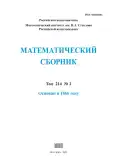Volume 214, Nº 2 (2023)
On volumes of hyperbolic right-angled polyhedra
Resumo
New upper bounds for the volumes of right-angled polyhedra in hyperbolic space $\mathbb{H}^3$ are obtained in the following three cases: for ideal polyhedra with all vertices on the ideal hyperbolic boundary; for compact polyhedra with only finite vertices; and for finite-volume polyhedra with vertices of both types.Bibliography: 23 titles.
Matematicheskii Sbornik. 2023;214(2):3-22
 3-22
3-22


Classification of Liouville foliations of integrable topological billiards in magnetic fields
Resumo
The topology of the Liouville foliations of integrable magnetic topological billiards, systems in which a ball moves on piecewise smooth two-dimensional surfaces in a constant magnetic field, is considered. The Fomenko-Zieschang invariants of Liouville equivalence are calculated for the Hamiltonian systems arising, and the topology of invariant 3-manifolds, isointegral and isoenergy ones, is investigated. The Liouville equivalence of such billiards to some known Hamiltonian systems is discovered, for instance, to the geodesic flows on 2-surfaces and to systems of rigid body dynamics. In particular, peculiar saddle singularities are discovered in which singular circles have different orientations — such systems were also previously encountered in mechanical systems in a magnetic field on surfaces of revolution homeomorphic to a 2-sphere. Bibliography: 13 titles.
Matematicheskii Sbornik. 2023;214(2):23-57
 23-57
23-57


On uniqueness for Franklin series with a convergent subsequence of partial sums
Resumo
We show that if the partial sums $S_{n_i}(x)=\sum_{k=0}^{n_i}a_kf_k(x)$ of a Franklin series $\sum_{k=0}^{\infty}a_kf_k(x)$, where $\sup_i{n_i}/(n_{i-1})<\infty$, converge in measure to a bounded function $f$ and $\sup_i|S_{n_i}(x)|<\infty$ for $ x\not\in B$, where $B$ is some countable set, then this series is the Fourier-Franklin series of $f$. Bibliography: 24 titles.
Matematicheskii Sbornik. 2023;214(2):58-71
 58-71
58-71


Cousin complex on the complement to the strict normal-crossing divisor in a local essentially smooth scheme over a field
Resumo
For any $\mathbb{A}^1$-invariant cohomology theory that satisfies Nisnevich excision on the category of smooth schemes over a field $k$ it is proved that the Cousin complex on the complement $U-D$ to the strict normal-crossing divisor $D$ in a local essentially smooth scheme $U$ is acyclic. This claim is also proved for the schemes $(X-D)\times(\mathbb{A}^1_k-Z_0)\times…\times(\mathbb{A}^1_k-Z_l)$, where $Z_0,…,Z_l$ is a finite family of closed subschemes in the affine line over $k$. Bibliography: 32 titles.
Matematicheskii Sbornik. 2023;214(2):72-89
 72-89
72-89


Multiplicities of limit cycles appearing after perturbations of hyperbolic polycycles
Resumo
The problem of the multiplicity of limit cycles appearing after a perturbation of a hyperbolic polycycle with generic set of characteristic numbers is considered. In particular, it is proved that the multiplicity of any limit cycle appearing after a perturbation in a smooth finite-parameter family does not exceed the number of separatrix connections forming the polycycle.Bibliography: 10 titles.
Matematicheskii Sbornik. 2023;214(2):90-111
 90-111
90-111


Geometric progressions in distance spaces; applications to fixed points and coincidence points
Resumo
Conditions on spaces $X$ with generalized distance $\rho_X$ are investigates under which analogues of Banach's and Nadler's fixed-point theorems and Arutyunov's coincidence-point theorem can be obtained for mappings on such spaces. This is shown to hold if each geometric progression with ratio $<1$ (that is, each sequence $\{ x_i\}\subset X$ satisfying $\rho_X(x_{i+1},x_i)\leq \gamma \rho_X(x_i,x_{i-1})$, $ i=1,2,…$, with some $\gamma < 1$) is convergent. Examples of spaces with and without this property are given. In particular, the required property holds in a complete $f$-quasimetric space $X$ if the distance $\rho_X$ in it satisfies $\rho_X(x,z) \leq \rho_X(x,y)+(\rho_X(y,z))^\eta$, $x,y,z \in X$, for some $\eta\in (0,1)$, that is, if the function $f\colon\mathbb{R}_+^{2} \to \mathbb{R}_+$ is given by $f(r_1,r_2)=r_1 + r_2^{\eta}$. Next, for $f(r_1,r_2)=\max\{ r_1^{\eta}, r_2^{\eta} \}$, where $\eta \in (0,2^{-1}]$, it is shown that for any $\gamma > 0$ there exists an $f$-quasimetric space containing a geometric progression with ratio $\gamma$ which is not a Cauchy sequence. The ‘zero-one law’, which means that either each geometric progression with ratio $<1$ is a Cauchy sequence or, for any $\gamma\in (0,1)$, there exists a geometric progression with ratio $\gamma$ that is not Cauchy, is discussed for $f$-quasimetric spaces. Bibliography: 29 titles.
Matematicheskii Sbornik. 2023;214(2):112-142
 112-142
112-142


On diameter $5$ trees with the maximum number of matchings
Resumo
A matching in a graph is any set of edges of this graph without common vertices. The number of matchings, also known as the Hosoya index of the graph, is an important parameter, which finds wide applications in mathematical chemistry. Previously, the problem of maximizing the Hosoya index in trees of radius $2$ (that is, diameter $4$) of fixed size was completely solved. This work considers the problem of maximizing the Hosoya index in trees of diameter $5$ on a fixed number $n$ of vertices and solves it completely. It turns out that for any $n$ the extremal tree is unique. Bibliography: 6 titles.
Matematicheskii Sbornik. 2023;214(2):143-154
 143-154
143-154










